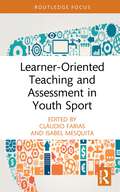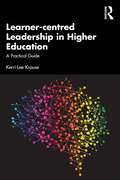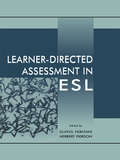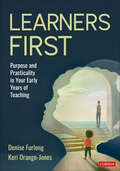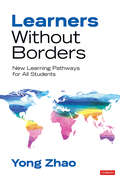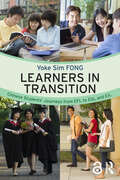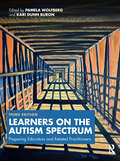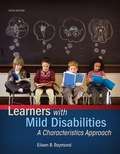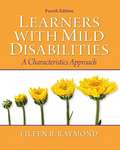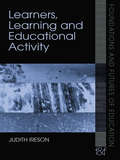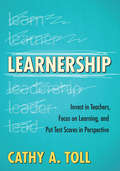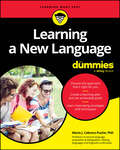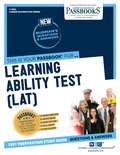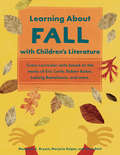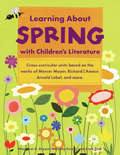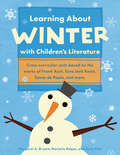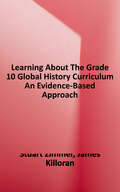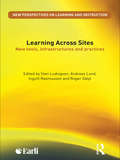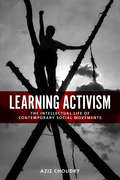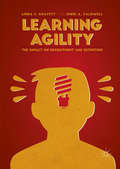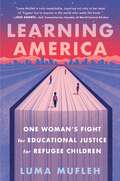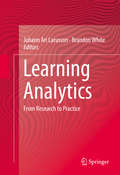- Table View
- List View
Learner-Oriented Teaching and Assessment in Youth Sport (Routledge Focus on Sport Pedagogy)
by Cláudio FariasThis book provides sport educators with a comprehensive, learner-centred instructional toolkit to empower children and young people in collaborative, independent learning of sport and games (SGs). The book is unique in bringing together the various pedagogical dimensions inherent to the teaching-learning process of SGs: the instructional system (teaching strategies), the social system (interactional climate), the task system (learning tasks and activities), and the assessment (for learning) system. It also shows how to effectively involve learners as active agents in promoting more democratic learning environments and equitable interactions between sportspersons. Written by a team of experts with extensive experience of using student-centred approaches as teachers, youth coaches, teacher educators, researchers, and theorists, the book introduces key concepts and evidence-based examples of best practice, with practical instructional strategies, learning tasks, and activities included in every chapter. As the chapters of the book unfold, they teach the reader how to create game-based tasks that are suited to different learner skill levels, how to align tasks, learning goals and learner needs, and feel empowered to engage young people in creativity development activities. Covering key themes in contemporary sport pedagogy from the constraints-led approach and appropriateness to learner-designed games and the use of technology, this is essential reading for all trainee and in-service physical education teachers and sports coaches working with children or young people.
Learner-centred Education in International Perspective: Whose pedagogy for whose development? (Education, Poverty and International Development)
by Michele SchweisfurthIs learner-centred education appropriate for all societies and classrooms? Learner-centred education (LCE) is a travelling policy, widely promoted by international agencies and national governments. Arguments in favour of this pedagogical tradition refer to theories and evidence from cognitive psychology, claiming that all learners can benefit equally from its judicious use. Beyond the benefits to the individual however, lie a set of assumptions about learner-centred education as a foundation for the building of democratic citizens and societies, suitable for economies of the future. These promises have been questioned by critics who doubt that it is appropriate in all cultural and resource contexts, and there is considerable evidence in the global South of perennial problems of implementation. In the light of these debates, is LCE still a good development ‘bet’? This book provides an authoritative and balanced investigation of these issues, exploring the contextual factors from global movements to local resourcing realities which have fuelled it as a discourse and affected its practice. In the light of the theoretical underpinnings and research evidence, the book addresses pressing questions: to what extent is learner-centred education a sound choice for policy and practice in developing countries? And if it is a sound choice, under which conditions is it a viable one? The book is divided into three key parts: - Learner-centred Education as a Global Phenomenon - Learner-centred Education in Lower and Middle-income Countries - Lessons and Resolutions This book provides a much-needed fresh analysis of the concept and practice of LCE. It will be valuable reading for academics and post-graduates with a focus on comparative and international education, along with policy-makers in developing countries and development agencies.
Learner-centred Leadership in Higher Education: A Practical Guide
by Kerri-Lee KrauseThis is the go-to guide for higher education leaders of learning, teaching and the learner experience. It offers research-enriched, practical insights and case studies, together with a must-have toolkit of strategies for future-focused higher education leaders. Kerri-Lee Krause combines her extensive track record as a senior university executive, award-winning teacher and higher education researcher. Inspired by the disruptive educational opportunities arising from the global COVID-19 pandemic, Krause takes academic and professional staff leaders on a journey through the core capabilities required of successful leaders in a rapidly changing higher education landscape. Key topics include: learner-centred strategy co-design; collaborative strategy implementation with learners at the heart; leading curriculum innovation and renewal; partnering with learners for engagement and success; collegial academic and professional staff capability-building and leadership development; coming to terms with educational policy development and quality work; shaping learner-centred cultures; and leading with integrity in higher education. As universities and higher education providers look for ways to rebuild in the wake of a global pandemic, capable, courageous, learner-centred leadership matters more than ever. This readable, intellectually rich and practical book is for current and aspiring higher education leaders who have a passion for effective leadership with learners at the heart.
Learner-directed Assessment in Esl
by Glayol V. Ekbatani Herbert D. PiersonThis text integrates the theory and practice of learner-based assessment. Written in response to two recent movements in language teaching--learner-centered teaching and a renewed interest in authenticity in language testing--it examines the relationship between the language learner and language assessment processes, and promotes approaches to assessment that involve the learner in the testing process. Particular attention is given to issues of reliability and validity. Grounded in current pedagogical applications of authentic assessment measures, this volume is intended for and eminently accessible to classroom teachers and program directors looking for ways to include their students in the evaluation process, graduate students, and professional language testers seeking authenticity in assessment and desiring to create more interactive evaluation tools.
Learners First: Purpose and Practicality in Your Early Years of Teaching
by Denise Furlong Keri Orange-JonesPractical advice, inclusive strategies, meaningful impact. The early years of teaching can be exhilarating and overwhelming in equal measure. Drawing on over 50 years of combined experience in public schooling, coaching, and higher education, authors Denise Furlong and Keri Orange-Jones equip novice educators with the tools, insights, and perspectives they need to thrive in today’s classrooms. Learners First applies an equity lens to a range of topics essential to every teacher’s first years in the classroom, including grading and assessment, inclusive practices for diverse learners, key considerations for multilingual learners, and more. Additional features include Chapter-opening reflection questions and key vocabulary to support understanding Quotes and vignettes from a diverse range of educators, including novice teachers, seasoned mentors, instructional coaches, and administrators Practical advice for lesson planning, assessments, evaluations, and behavior management With its holistic approach to the whole child and the whole teacher, Learners First empowers educators to foster inclusive classrooms and develop as resilient, reflective professionals. This essential guide is more than a "survival guide" for new teachers—it’s a call to action and growth.
Learners First: Purpose and Practicality in Your Early Years of Teaching
by Denise Furlong Keri Orange-JonesPractical advice, inclusive strategies, meaningful impact. The early years of teaching can be exhilarating and overwhelming in equal measure. Drawing on over 50 years of combined experience in public schooling, coaching, and higher education, authors Denise Furlong and Keri Orange-Jones equip novice educators with the tools, insights, and perspectives they need to thrive in today’s classrooms. Learners First applies an equity lens to a range of topics essential to every teacher’s first years in the classroom, including grading and assessment, inclusive practices for diverse learners, key considerations for multilingual learners, and more. Additional features include Chapter-opening reflection questions and key vocabulary to support understanding Quotes and vignettes from a diverse range of educators, including novice teachers, seasoned mentors, instructional coaches, and administrators Practical advice for lesson planning, assessments, evaluations, and behavior management With its holistic approach to the whole child and the whole teacher, Learners First empowers educators to foster inclusive classrooms and develop as resilient, reflective professionals. This essential guide is more than a "survival guide" for new teachers—it’s a call to action and growth.
Learners Without Borders: New Learning Pathways for All Students
by Yong ZhaoThe future of education centers empowered students in a global learning ecosystem. Despite decades of reform, the traditional borders of education—graduation, curriculum, classrooms, schools—have failed to deliver on the goals of excellence and equity. Despite massive societal changes, education remains controlled by an old mindset. It is time to change that limiting mindset and, more importantly, the ineffective practices in education. To truly serve all learners, future classrooms must remove the boundaries of learning and become student-centered, culturally responsive, and personalized—supportive and equitable environments where each student can direct their own learning and seek multiple pathways to skills and knowledge in a global learning ecosystem. This compelling call for transformative change offers all involved in education Evidence-based arguments that reveal the need to break the traditional borders that limit learning Strategies to personalize learning and remove the confinement of traditional pathways Examples from around the world to create equitable and student-centric learning environments Resources for creating a school learning environment that expands opportunities for personalized learning into the global learning ecosystem It is time to now imagine a different kind of learning, without borders, and to begin the shifts in practice that will result in personalized learning for all students.
Learners Without Borders: New Learning Pathways for All Students
by Yong ZhaoThe future of education centers empowered students in a global learning ecosystem. Despite decades of reform, the traditional borders of education—graduation, curriculum, classrooms, schools—have failed to deliver on the goals of excellence and equity. Despite massive societal changes, education remains controlled by an old mindset. It is time to change that limiting mindset and, more importantly, the ineffective practices in education. To truly serve all learners, future classrooms must remove the boundaries of learning and become student-centered, culturally responsive, and personalized—supportive and equitable environments where each student can direct their own learning and seek multiple pathways to skills and knowledge in a global learning ecosystem. This compelling call for transformative change offers all involved in education Evidence-based arguments that reveal the need to break the traditional borders that limit learning Strategies to personalize learning and remove the confinement of traditional pathways Examples from around the world to create equitable and student-centric learning environments Resources for creating a school learning environment that expands opportunities for personalized learning into the global learning ecosystem It is time to now imagine a different kind of learning, without borders, and to begin the shifts in practice that will result in personalized learning for all students.
Learners in Transition: Chinese Students’ Journeys from EFL to ESL and EIL
by Yoke Sim FongAs the number of Chinese students learning English increases worldwide, the need for teachers to understand the characteristics and challenges facing this group of learners grows. This is particularly true for those students moving from an English as a Foreign Language context to an English as a Second Language/International Language one where they experience academic, linguistic and sociocultural transitions. Drawing on over 20 years’ experience teaching English courses to Chinese learners, the author aims to highlight key findings to aid understanding, improve teachers’ practice and offer pedagogical recommendations. Using students’ voices, the book covers: how the traditional Chinese culture of learning plays a role; how new learning contexts provide opportunities and empowerment; how learners’ beliefs and strategies are interconnected; how their motivation and identity underscore the power of real and imagined communities, and finally, that affect matters, showing how learners are propelled by the trajectory of their emotions. The book cites from the rich data collected over a five-year period to authenticate the findings and recommendations but also to give voice to this group of learners to challenge the stereotype of the passive "Chinese learner". The essential insights contained within are useful for pre- and in-service teachers of English and researchers interested in language education around the world.
Learners on the Autism Spectrum: Preparing Educators and Related Practitioners
by Pamela Wolfberg Kari Dunn BuronThis third edition is a foundational text that has been updated and expanded to prepare educators, therapists, and other care providers with vital knowledge and practical skills to support diverse learners on the autism spectrum. Covering an expanse of fundamental topics, this edited volume features new directions in research and practice that are essential to understanding the ever-changing field of autism. Along with new chapters from leading experts (including those who identify as autistic), this revision places greater emphasis on the intersection of neurodevelopmental differences with ethnicity, race, culture, language, gender expression, and socioeconomic experiences. The diverse disciplines and perspectives presented provide a foundation on how these students learn and how best to provide them with effective teaching, therapy, and social supports. This book equips readers with knowledge and skill to competently apply reflective and humanistic practices that prioritize the preferences, strengths, and values of autistic learners from all walks of life.
Learners with Mild Disabilities: A Characteristics Approach
by Eileen B. RaymondLearners with Mild Disabilities: A Characteristics Approach focuses on high-prevalence disorders affecting school learners today, including mild intellectual disabilities, learning disabilities, emotional/behavioral disorders, ADHD, autism spectrum disorders, and communication disorders, as well as on low incidence conditions that may manifest in the milder range, for example sensory, physical, health, or TBI. The author lays the foundation for addressing the needs of special learners and then focuses on learners from the perspective of alternative non-categorical frameworks. She describes students with disabilities and related conditions with respect to a variety of individual strengths and needs, considering their cognitive, language, academic learning, and social/emotional characteristics. Readers see how to apply these conceptual frameworks by analyzing a number of vignettes and extended case studies based on the experiences of real children and teachers. Designed as a primary text for use in undergraduate and graduate courses addressing the characteristics of learners with high prevalence or milder levels of disability, the text is also useful for the first specialized course in a special education program. It supports programs in inclusive education or the growing area of generic special education. The Enhanced Pearson eText features embedded video.
Learners with Mild Disabilities: A Characteristics Approach (4th Edition)
by Eileen B. RaymondA critical look at four high-prevalence mild disabilities as seen from several unique perspectives: mild intellectual disabilities, learning disabilities, emotional/behavioral disorders, and ADHD. The text also considers the Autism Spectrum Disorders, such as HFA and Asperger's Syndrome, in addition to other mild conditions such as communication disorders. This text looks first at the concept of disability from conventional categorical perspectives, and then shifts to focusing on learners from the perspective of alternative, non-categorical frameworks. It describes students with disabilities and related conditions with respect to a variety of individual strengths and needs, considering their cognitive, perceptual, language, academic learning, and social/emotional characteristics. The reader is encouraged to apply these conceptual frameworks through the analysis of numerous vignettes and extended case studies that are drawn from the experiences of real children and teachers throughout the text. Using this non-categorical framework best prepares special educators for the complex job of providing effective services to the full and unique spectrum of students with mild disabilities.
Learners, Learning and Educational Activity (Foundations and Futures of Education)
by Judith IresonLearners, Learning and Educational Activity offers a new and creative approach to the psychology of learning. The central idea in the book is that learning in schools and other educational settings is best understood by paying attention to both individual learners and the educational contexts in which learning takes place. Providing an accessible introduction to new ideas and recent developments in cognitive and socio-cultural perspectives on learning, the book reviews advances in selected topics that are especially relevant for teachers and other educators. These include: learners’ conceptions of the nature of learning the development of advanced levels of learning and thinking the role of motivation and self-regulation in learning how learning and thinking relate to social and cultural contexts the ways in which these contexts influence interactions between teachers and learners. By illustrating connections between individual and social aspects of learning in educational settings in and out of school, the book encourages teachers, parents and other educators to think about learners and learning in new ways.
Learnership: Invest in Teachers, Focus on Learning, and Put Test Scores in Perspective
by Cathy A. TollPut the focus of education back where it belongs—on learning! Do you feel bogged down by endless administrative tasks? Do you wish you could focus more on what truly matters—learning? Learnership provides both insight and solutions for moving past distractions and becoming a learning leader. Cathy Toll illustrates how the practice of learnership can be implemented every day through activities, real-life stories, and narrative bibliography. This book offers: Practices to help teachers improve their effectiveness using problem-solving techniques; More effective ways to approach data, testing, and accountability; Strategies for supporting Professional Learning Teams (PLT) and educational coaches.
Learning A New Language For Dummies
by Maria J. Cabrera-PucheStrategies, tools, and motivation for learning a new language Learning A New Language For Dummies explains how you can create a personal plan to achieve your language learning goals. Get research-based suggestions for speeding up your language acquisition and learn about the benefits of leveling up your linguistic ability. Even if you've never studied a language before, this easy-to-understand guide will prepare you to pick the learning methods that will work best for you. You#ll also get an intro to the basics of how humans learn languages, so you can stay motivated, set realistic goals, and achieve success. No matter what language you want to learn, this Dummies guide will help you start off on the right foot. Choose a language learning approach that fits you and your lifestyle Get step-by-step guidance for making a plan and setting achievable goals Learn techniques and strategies for learning quicker and retaining more Improve your odds of success with a foundation of knowledge about the learning process Anyone considering learning a new language or refreshing their knowledge of a language—and language teachers, too—will love Learning a New Language For Dummies.
Learning Ability Test: Passbooks Study Guide (Career Examination Series #C-1062)
by National Learning CorporationThe Learning Ability Test (LAT) Passbook® prepares you for your test by allowing you to take practice exams in the subjects you need to study. It provides hundreds of questions and answers in the areas that will likely be covered on your upcoming exam.
Learning About Fall with Children's Literature: Cross-curricular Units Based On The Works Of Eric Carle, Robert Kalan, Ludwig Bemelmans And More
by Margaret Bryant Anne Petit Marjorie KeiperTaking a thematic approach to learning that employs seeing, hearing, reading, and writing, these books outline three four-week, cross-curricular units that develop the competencies children need to become fluent, independent readers and writers. While each unit focuses primarily on language--phonic skills, structural analysis, punctuation, capitalization, poetry, and comprehension--they also include math, science, social studies, music, art, and even mini-lessons in French for cross-cultural appreciation. Understanding that student ability levels in younger grades can vary widely, lesson plans are keyed to three types of learners: emerging, typical, and advanced. The series includes three titles that cover fall, spring, and winter, and each can be used independently or together throughout the school year.
Learning About Spring with Children's Literature
by Margaret Bryant Anne Petit Marjorie KeiperTaking a thematic approach to learning that employs seeing, hearing, reading, and writing, these books outline three four-week, cross-curricular units that develop the competencies children need to become fluent, independent readers and writers. While each unit focuses primarily on language--phonic skills, structural analysis, punctuation, capitalization, poetry, and comprehension--they also include math, science, social studies, music, art, and even mini-lessons in French for cross-cultural appreciation. Understanding that student ability levels in younger grades can vary widely, lesson plans are keyed to three types of learners: emerging, typical, and advanced. The series includes three titles that cover fall, spring, and winter, and each can be used independently or together throughout the school year.
Learning About Winter with Children's Literature
by Margaret Bryant Anne Petit Marjorie KeiperTaking a thematic approach to learning that employs seeing, hearing, reading, and writing, these books outline three four-week, cross-curricular units that develop the competencies children need to become fluent, independent readers and writers. While each unit focuses primarily on language--phonic skills, structural analysis, punctuation, capitalization, poetry, and comprehension--they also include math, science, social studies, music, art, and even mini-lessons in French for cross-cultural appreciation. Understanding that student ability levels in younger grades can vary widely, lesson plans are keyed to three types of learners: emerging, typical, and advanced. The series includes three titles that cover fall, spring, and winter, and the books can be used independently or together throughout the school year.
Learning About the Grade 10 Global History Curriculum: An Evidence-Based Approach
by James Killoran Stuart ZimmerThis book is organized around the New York State Grade 10 Social Studies Framework. If it has anything to do with the Grade 10 curriculum in Social Studies, it is covered in this book. The book is designed to help you do your best in Global History and Geography. To accomplish that end, the book is divided into three parts: Introductory Unit, Content Chapters, and Final Review Unit.
Learning Across Sites: New Tools, Infrastructures and Practices (New Perspectives on Learning and Instruction)
by Sten LudvigsenThe ever evolving, technology-intensive nature of the twenty-first century workplace has caused an acceleration in the division of labour, whereby work practices are becoming highly specialised and learning and the communication of knowledge is in a constant state of flux. This poses a challenge for education and learning: as knowledge and expertise increasingly evolve, how can individuals be prepared through education to participate in specific industries and organisations, both as newcomers and throughout their careers? Learning Across Sites brings together a diverse range of contributions from leading international researchers to examine the impacts and roles which evolving digital technologies have on our navigation of education and professional work environments. Viewing learning as a socially organised activity, the contributors explore the evolution of learning technologies and knowledge acquisition in networked societies through empirical research in a range of industries and workplaces. The areas of study include public administration, engineering, production, and healthcare and the contributions address the following questions: How are learning activities organised? How are tools and infrastructures used? What competences are needed to participate in specialised activities? What counts as knowledge in multiple and diverse settings? Where can parallels be drawn between workplaces? Addressing an emerging problem of adaptation in contemporary education, this book is essential reading for all those undertaking postgraduate study and research in the fields of educational psychology, informatics and applied information technology.
Learning Activism: The Intellectual Life Of Contemporary Social Movements
by Aziz ChoudryWhat do activists know? Learning Activism is designed to encourage a deeper engagement with the intellectual life of activists who organize for social, political, and ecological justice. Combining experiential knowledge from his own activism and a variety of social movements, Choudry suggests that such organizations are best understood if we engage with the learning, knowledge, debates, and theorizing that goes on within them. Drawing on Marxist, feminist, anti-racist, and anti-colonial perspectives on knowledge and power, the book highlights how activists and organizers learn through doing, and fills the gap between social movement practice as it occurs on the ground, critical adult education scholarship, and social movement theorizing. Examples include anti-colonial currents within global justice organizing in the Asia-Pacific, activist research and education in social movements and people's organizations in the Philippines, Migrant and immigrant worker struggles in Canada, and the Quebec student strike. The result is a book that carves out a new space for intellectual life in activist practice.
Learning Agility
by Linda S. Gravett Sheri A. CaldwellThis book concretely defines the concept of learning agility and offers a business case for why organizations of all types should concentrate on building and sustaining this approach. It provides readers with a holistic approach towards the topic, and helps leaders leverage the learning agility of individual employees to sustain a learning-agile workplace culture. Synthesizing academic research and practical approaches, this book takes leaders through ways to interview and assess potential employees for learning agility, develop and foster an environment for learning agility, and measure the results of a learning agile workplace. The authors present an innovative learning agility assessment which has been developed, tested, and implemented by clients and outline metrics which can measure the results of a learning agile workforce. This little-understood but highly advantageous approach is crucial for leaders to understand if they wish to deliver results and impact their organizations' bottom line.
Learning America: One Woman's Fight for Educational Justice for Refugee Children
by Luma MuflehA visionary leader&’s powerful personal story and a blueprint for change that will inspire schools and communities across AmericaLuma Mufleh—a Muslim woman, a gay refugee from hyper-conservative Jordan—joins a pick-up game of soccer in Clarkston, Georgia. The players, 11- and 12-year-olds from Liberia and Afghanistan and Sudan, have attended local schools for years. Drawn in as coach of a ragtag but fiercely competitive team, Mufleh discovers that few of her players can read a word. She asks, &“Where was the America that took me in? That protected me? How can I get these kids to that America?&” For readers of Malala, Paul Tough, and Bryan Stevenson, Learning America is the moving and insight-packed story of how Luma Mufleh grew a soccer team into a nationally acclaimed network of schools—by homing in laserlike on what traumatized students need in order to learn. Fugees accepts only those most in need: students recruit other students, and all share a background of war, poverty, and trauma. No student passes a grade without earning it; the failure of any student is the responsibility of all. Most foundational, everyone takes art and music and everyone plays soccer, areas where students make the leaps that can and must happen—as this gifted refugee activist convinces—even for America&’s most left-behind.
Learning Analytics
by Johann Ari Larusson Brandon WhiteIn education today, technology alone doesn't always lead to immediate success for students or institutions. In order to gauge the efficacy of educational technology, we need ways to measure the efficacy of educational practices in their own right. Through a better understanding of how learning takes place, we may work toward establishing best practices for students, educators, and institutions. These goals can be accomplished with learning analytics. Learning Analytics: From Research to Practice updates this emerging field with the latest in theories, findings, strategies, and tools from across education and technological disciplines. Guiding readers through preparation, design, and examples of implementation, this pioneering reference clarifies LA methods as not mere data collection but sophisticated, systems-based analysis with practical applicability inside the classroom and in the larger world. Case studies illustrate applications of LA throughout academic settings (e. g. , intervention, advisement, technology design), and their resulting impact on pedagogy and learning. The goal is to bring greater efficiency and deeper engagement to individual students, learning communities, and educators, as chapters show diverse uses of learning analytics to: Enhance student and faculty performance. Improve student understanding of course material. Assess and attend to the needs of struggling learners. Improve accuracy in grading. Allow instructors to assess and develop their own strengths. Encourage more efficient use of resources at the institutional level. Researchers and practitioners in educational technology, IT, and the learning sciences will hail the information in Learning Analytics: From Research to Practice as a springboard to new levels of student, instructor, and institutional success.
